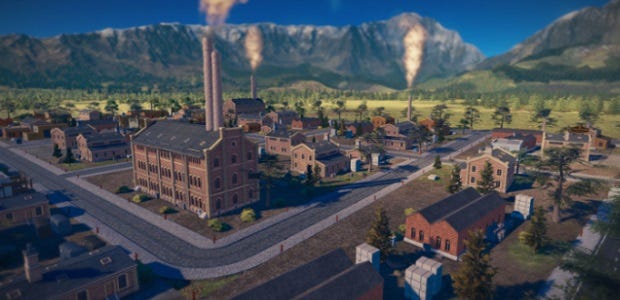Urban Empire Is A Fascinating Political Citybuilder
I trust I can rely on your vote
Urban Empire [Steam page] is a political citybuilding game that spans two hundred years of European history, from 1820 to 2020. If you've enjoyed elements of The Guild, Cities: Skylines, Democracy or Dragon Commander, this is almost certainly going to be a game for you. Dynamic political decisions, elections, blackmail and threats, district management, and a tech 'cloud' that is made up of social ideas as well as science. It looks fantastic.
Developers Fragment have released several titles, focusing on simulations based around city services most notably with the Rescue: Everyday Heroes series. Urban Empire marks a change in direction and is the studio's most ambitious game to date, combining a basic citybuilder with a multi-party political model that undergoes radical changes during the two centuries that a playthrough covers. Before digging into that side of the game, it's important to understand what you can and can't do when actually constructing your city.
Fragment share a home town with Colossal Order - Tampere, 100 miles North of Helsinki - where founder and creative director Mikko Tyni had previously spent time working on the Cities in Motion series. Urban Empire initially looks like a historical take on Colossal Order's latest, Cities: Skylines, but beyond surface similarities it has very little in common with that game or the ones that inspired it. Instead, this is a game about managing the expansion and development of a city by means of political maneuvering, against the backdrop of a world undergoing all of the changes of the modern era.
You won't be placing water pipes and power lines. In fact, you won't even be placing roads. All of that is left to the civic planners and private enterprises that fill the districts that you paint onto the map. District placement allows you to create the shape of the city, as well as informing the kind of structures and services that might populate each new area. As soon as you choose to expand though, you'll be faced with your first vote.
Skyline and SimCity play out on the map of the city itself but Urban Empire's heart is the council chamber, where voting takes place. When you place a district, representatives of each political party vote to decide whether or not they support the expansion. If you really want that district or feel that the city needs it, you can use private funds (if they're available) to dodge the vote, but otherwise you're at the mercy of the chamber.
At the beginning of the game, nobody is going to block expansion. It's clearly good for the city and its people, and none of the parties are going to have personal issues with your character. No issues that can't be fixed, at any rate. As the city grows, and crises and opportunities arise, you'll make friends and enemies on all sides. Parties have their own ideologies and goals, and supporting them might earn you favour that can be used when a contentious decision has to be pushed through parliament. Failing that, you an always bribe, threaten, coax and cajoke, though every option could backfire.
The voting takes place on a screen that shows a representation of the parties, seated at their benches and identified by flags. As the count comes in, the 'yes' and 'no' bars fill. It's a speedy process but effectively tense. A landslide victory is reassuring and encouraging, while a close fought battle that ends in defeat is cause for clenched fists and swearing.
You're not the only person who can trigger a vote. The parties will raise issues, reacting dynamically to a combination of the current political situation in both the city (which you affect as you play) and the wider world (which is a linear, historical narrative). The latter is the most interesting aspect of the game and the one that is hardest to appreciate fully without extended hands-on time. Essentially, while each playthrough will create new scenarios - through events that occur dynamically and through player direction in both the building of the city, the manipulation of politics and the path taken through the research cloud – the story of the fictional empire that your city is a part of is already written.
Every time you play, the empire will eventually dissipate because that is what empires tended to do as the twentieth century was born, screaming. You'll be insulated from much of the screaming, embedded in domestic affairs as you are, and I find the idea of a game which has conflict relegated to the background fascinating. The world will go to war (twice), leading to new international political organisations and new homegrown political parties, as well as the end of existing parties. It's that political impact, on the homefront, that'll matter to you, as mayor.
Currently, there's no way to lose the game in the imperial stages. At any one time, you're playing as a specific character. If you've ever been staring at a city on your screen, dropping a police station into position, and wondered, “who am I?”, this is the game for you. You're a proper person, with stories of your own. In a lovely touch, the loading screens show an image of the character you're currently playing as, with a quote underneath, making them seem like real historical people. At the beginning of each game, you can choose from one of several families and each has several playable characters, who you'll take control of at set times through the two hundred years of play.
That's provided you make it through those two hundred years. While there's no fail state in the early game, as soon as the imperial age ends, you can lose the game by losing an election. That adds extra pressure. Not only are you trying to build the city of your dreams, whether they be utilitarian or utopian, you're also trying to ensure that you please enough of the people in the short-term to remain in power. Given the volatility of the political and social scenes in the twentieth century, that could be extremely tricky. Along the way, you'll have to deal with all manner of events arising from social and technological progress, from women's liberation to the advent of social media and new sources of industry and economic control.
Being mistaken for a citybuilder is the worst thing that could happen to Urban Empire. The city is simply the most obvious visual output of the game's machinery, which is the dynamic political decision-making, and progress through the troubles and triumphs of modern Europe. At its core, I recognise a familiar and satisfying loop: you expand your city to create more 'brainpower', the resource which allows you to advance research, and that progress in turn creates new possibilities for growth and new dilemmas.
In Skylines, SimCity and the rest, it's difficult to fail. Even the most polluted and miserable of cities can recover, given a little care and a lot of patience. Urban Empire acknowledges that some cities, and some states, do fail. And so do certain political dynasties. While the history of the world remains the same on each playthrough, the existence of your city is defined by dynamic events and your reactions to those events, as well as the relationships you form over the decades.
It's one of the most intriguing approaches to urban management that I've seen in a long time, with much of the appeal of Dragon Commander's political decisions, though without the fantasy and flippancy of that game. Or the meandering RTS sections. It's set for release next year and I'm hoping to have another long look at it before then.













